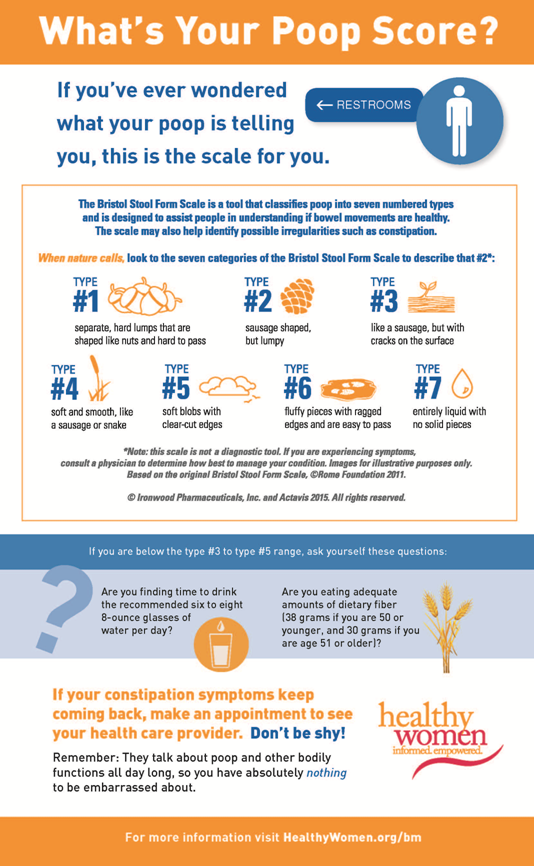In our last post about bowel movements (An Ideal #2 May Not Be a #2, Part One) we went over the seven types of bowel movements according the Bristol Stool Form Scale. In this post, we will discuss some things you can do that may help your bowel movements.
For many people, having bowel movements in the “middle of the pack” – 3, 4, or 5 – is a good sign. If this doesn’t sound like you, there are things you can try that may help get your poop back on track.
First, take an honest look at what you are putting into your body:
- Are you drinking enough water (six to eight 8-ounce glasses per day)?
- Are you eating adequate amounts of dietary fiber (38 grams if you are 50 or younger, and 30 grams if you are age 51 or older)?
If not, try bumping your intake of these natural stool softeners to the targeted daily levels. Good sources of dietary fiber include fruits, vegetables, whole grains and beans.
Constipation is generally defined as having fewer than three bowel movements per week, having difficulty while passing a bowel movement or both. Over-the-counter medications including laxatives and stool softeners are approved for occasional constipation. These products may temporarily alleviate constipation, but they are not approved to treat chronic constipation and should not be used long term without the supervision of a healthcare provider.
If your constipation symptoms keep coming back, you may have more than occasional constipation. You may have a form of chronic constipation. As many as 35 million adults suffer from chronic idiopathic constipation (CIC), which is constipation without a known cause, and as many as 13 million adults suffer from irritable bowel syndrome with constipation (IBS-C), one of the three major types of IBS. Prescription medications are available for the treatment of CIC and IBS-C.
To try to identify or rule out these conditions, as well as other more serious causes of constipation—such as bowel obstruction, cancer, medication side effect or neurological diseases—it’s important to speak candidly to your healthcare provider about all of your symptoms (including bloating and any abdominal pain or discomfort). The more you tell, the better he or she can help to manage your condition.
Keep in mind that healthcare professionals talk about bodily functions all day, so don’t be embarrassed about discussing your bathroom habits. With more knowledge of your symptoms and your Bristol Stool Form Scale category, your healthcare provider can help determine the best next steps for you.
Remember: You don’t have to sit on the sidelines with constipation, and you don’t have to take painful or infrequent bowel movements lying down. With the right healthy training, you can rise to the top of your poop game.
For more information, visit www.AboutYourGut.com.
This program was supported by Actavis and Ironwood Pharmaceuticals.





Another very interesting post! To be honest, I never knew how much water we should be drinking on a daily basis. Now that I know that I usually come up short, it is something I can use to improve my overall health as well as my bowel habits.
It’s great that this article so simply and succinctly gets its point across. I never knew much about bowel movements and what medically constituted constipation. Now I am am better aware of how to monitor my bowel movements and what I can do to keep them healthy and regular.